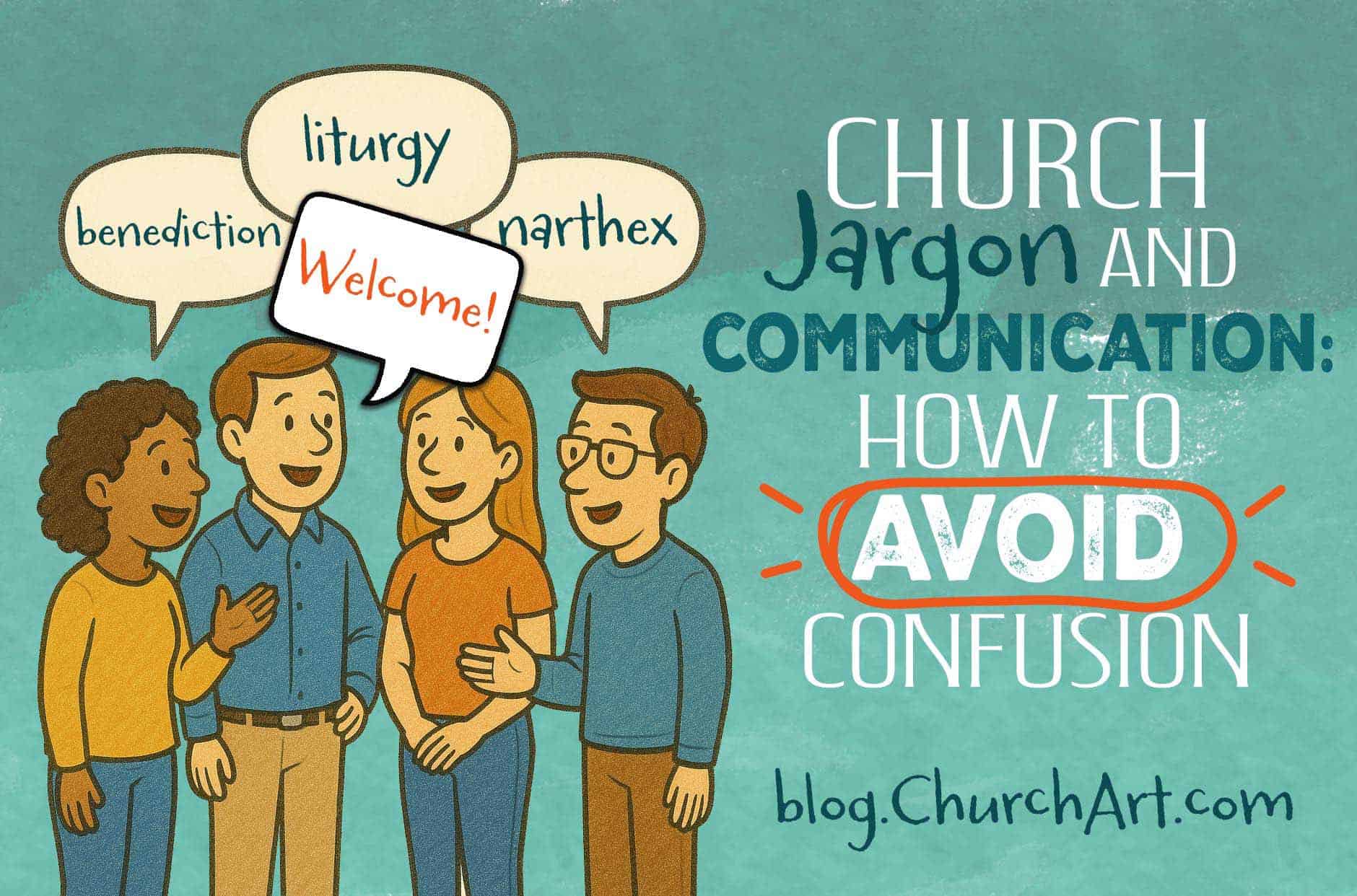
Church Jargon and Communication: How to Avoid Confusion
Every Christian church has a communication mission: sharing the good news of Jesus Christ. But the terms we use to communicate about God can become an obstacle, sometimes making people feel left out.

Pastors and church people — those who’ve grown up in the faith or attended church for years — might be familiar with words used during worship and in congregational publications. But visitors, newcomers, and non-Christian folks might feel lost. Unfortunately, that means they might not return.
For example, an order of service might list a prelude, the liturgy, a homily, the tithe, and a benediction. The meaning of those words might escape many attendees on a Sunday morning. Then after worship, people might be invited to pick up a welcome gift in the narthex, enjoy fellowship in the Holy Grounds room, or join a Bible study with a group of other seekers.
Instead of putting guests at ease, this type of language makes people feel awkward — or at least leaves them craving context. Keep reading to learn more about church jargon and communication. Church leaders and parishioners (aka church members!) can use these tips to keep meanings clear.
Insights About Church Jargon and Communication
First, know that almost every organization and field uses specialized terms and shorthand phrases. This vocabulary identifies people as part of a group with common interests and bonds.
In Christianity, some insider language — known as church-speak — is tough to avoid. Christianity has deep theological roots, and your church body has a rich history. Church leaders and congregants reference the Bible and prayers, as well as catechisms, hymns, and creeds. But when language becomes too obscure, it interferes with comprehension and confuses or excludes an audience.
Yes, jargon might save newsletter space and lead to more concise social media posts. But it can make your church seem like an exclusive club. Church publications and communications serve as evangelism tools, so try to use wording that’s accessible and friendly. That way, visitors won’t feel left out or lose interest.
Types of Church Jargon and Communication
Check out these categories of church-related jargon. How do your website pages, bulletin covers, and social media messages fare in these areas?
- Religious terms — Although faith-related phrases are expected at church, people with no church background might feel overwhelmed. Guests won’t know what to do when it’s time to pass the peace, for example, so invite people to shake hands and “Welcome one another with God’s peace.” Instead of referring to someone’s testimony, use “faith story.”
Also avoid jargon that assumes all readers are familiar with the Bible and Christian faith traditions. Scripture references can be intimidating to people who don’t know about chapter-and-verse citations or who aren’t familiar with Bible verses by reference only. Seasons of the church year (Advent, Pentecost), building locations (chancel, vestibule) and church titles (elder, deacon) are baffling too.

- Euphemisms — While trying to soften the impact of tough spiritual topics and life-and-death issues, don’t muddy the message. For example, use died, not called home or entered the Church Triumphant. Use Holy Spirit, not the Advocate or the Spirit of Truth. Minimize flowery language to keep church communications clear and straightforward.
- Acronyms — To save space, church editors tend to rely on an alphabet soup of abbreviations and acronyms. It isn’t necessary to banish all those shortcuts. Instead, provide the full title on first reference, followed by the acronym in parentheses. Then on future references, use just the acronym. For calendars and other places with limited space, supply an easy-to-read key.
- Vague names — Church groups often have clever names that aren’t self-explanatory. Keenagers is a cute name for senior adults, yet that connection might elude visitors. Youth and children’s ministries also use creative names that aren’t always descriptive. In the church newsletter and on the church website, add a standing box that identifies and explains each group.
- Blanket terms — Many church groups rely on a few general terms to describe their activities: ministry, fellowship, witness, and so on. Newcomers won’t know what to expect from a Stephen Minister or from the JOY Fellowship, for example.
- Shop talk — Like doctors and engineers, pastors and church staff members use language that is specific to their professions. They might refer to visitations (hospital visits) or seeker-sensitive services (programming that welcomes outsiders). Limit such terms to meetings or conferences with peers. In publications for congregants and the community, stick to everyday language.
- Incomplete information — Avoid jargon that assumes all readers are familiar with individual staff members. Even if most church members know pastors by first names or nicknames, erase any doubt by printing full names and contact information.
More Tips to Eliminate Church Jargon
- Stay vigilant! Some church lingo may seem so familiar that you don’t realize it stymies other people. Be aware of how words — even phrases taken directly from the Bible — come across.
- Try reading the publication from the perspective of a non-member or an unchurched person. Based on the language, how comfortable would you feel attending this church? What might confuse or frustrate you?
- Ask a new member or visitor to evaluate church communications (bulletins, flyers, posts) for reader-friendliness. Honest feedback is valuable, and these new friends will express thanks for your concern.
- Develop your own list of church-speak to avoid. Regularly update that document to remain inclusive.
- Use a grammar-checking program to highlight suspect phrases. Every time the program pauses, think of a more common descriptive option.
- Ask readers to submit any church-related language they read or hear that’s difficult to understand. In future issues or in a regular column, define and explain the terms.
A final note: You don’t need to eliminate all terminology that your church treasures. If you prefer a term such as narthex, just add a small visual to guide newcomers. This might be a small photo in the bulletin or an icon on a campus map.
With church communications, every word has a purpose. But simpler is often better. Avoiding church jargon keeps everyone informed and included. Whether you call the church entrance a narthex, a lobby, or an entrance? Prioritize relationships — and make people feel welcome when they walk into that area.
These church words might confuse some people. When possible, explain the meaning or replace the terms with language that is more reader friendly.
| Church Word | What It Means | Reader-Friendly Language |
| Benediction | A blessing at the end of worship | Closing prayer |
| Born again | Spiritual rebirth | Join God’s family |
| Bring before the throne room | Boldly approaching God in prayer | Ask God with confidence |
| Catechism | A collection of religious Q&As | Faith teachings |
| Christian walk | Faith journey | Following Jesus daily |
| Eternal reward | Spending eternity with God in heaven | Living with Jesus forever |
| Eucharist | Sacrament of Holy Communion | The practice of remembering Christ’s death for us |
| Fellowship | Spending time together as Christians | Get-together or gathering |
| Grounded in the Word | Following Bible-based teachings | Living according to God’s teachings in the Bible |
| Narthex | The entry area of the church | Lobby or entrance |
| Sanctuary | The main worship space | Church auditorium |
| Sinner’s prayer | Asking Jesus into your heart | Committing to follow Jesus |
| Spiritual gifts | Talents from the Holy Spirit for building up the church | God-given abilities we use to serve him and others |
| Tithe | Giving 10% of income | Offering or giving |
| Washed in the blood of the Lamb | Jesus’ sacrificial death that leads to forgiveness | Jesus died to take away our sins |
Stephanie Martin
Stephanie Martin is a senior editor at Communication Resources, producing monthly issues of The Newsletter Newsletter and ChurchArt Online. For more than three decades, she has written and edited materials for Christian congregations and ministry leaders. At her Denver-area church, Stephanie has volunteered in a variety of areas, from Sunday school and VBS to finances and administration.



